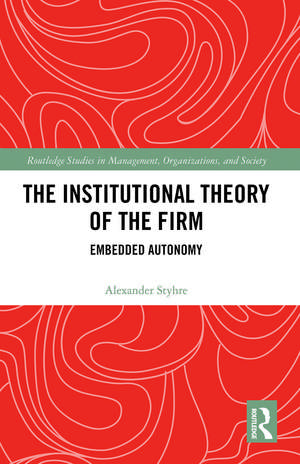The Institutional Theory of the Firm: Embedded Autonomy: Routledge Studies in Management, Organizations and Society
Autor Alexander Styhreen Limba Engleză Paperback – 31 mar 2021
When advocating the institutional theory model, three forms of embedded autonomy are examined. First, the corporation is enacted as a legal entity sui juris—as a freestanding "legal person" in corporate law and within the regulatory framework that serves to enforce legislation in everyday life settings. Second, the corporation is embedded within what social theorists refer to as moral economies, the norms and values that regulate what are the socially acceptable and legitimate means for conducting business. Third and finally, the corporation is embedded in governance, a relatively complex economic concept that denotes legal and regulatory control on the societal and economic system levels, and on the level of the individual corporation. By combining the three forms of embeddedness, sanctioned by law, norms, and governance, the embedded autonomy of the firm is secured on the basis of a variety of social practices and resources.
This book brings together a diverse literature including management studies, economic sociology, legal theory, finance theory, and mainstream economic theory to advance the argument that the corporation is best understood as what is embedded in a social and economic context, yet best serving its defined and stipulated ends by assuming considerable degrees of freedom to operate in isolation from various stakeholders. It will be of relevance for a variety of readers, including graduate students, management scholars, policy-makers, and management consultants interested in organization theory and management studies.
| Toate formatele și edițiile | Preț | Express |
|---|---|---|
| Paperback (1) | 381.72 lei 6-8 săpt. | |
| Taylor & Francis – 31 mar 2021 | 381.72 lei 6-8 săpt. | |
| Hardback (1) | 1000.27 lei 6-8 săpt. | |
| Taylor & Francis – 30 iul 2019 | 1000.27 lei 6-8 săpt. |
Din seria Routledge Studies in Management, Organizations and Society
-
 Preț: 311.41 lei
Preț: 311.41 lei -
 Preț: 379.69 lei
Preț: 379.69 lei -
 Preț: 392.62 lei
Preț: 392.62 lei -
 Preț: 309.04 lei
Preț: 309.04 lei -
 Preț: 311.59 lei
Preț: 311.59 lei -
 Preț: 325.53 lei
Preț: 325.53 lei -
 Preț: 324.68 lei
Preț: 324.68 lei -
 Preț: 311.26 lei
Preț: 311.26 lei -
 Preț: 309.82 lei
Preț: 309.82 lei -
 Preț: 310.37 lei
Preț: 310.37 lei -
 Preț: 308.97 lei
Preț: 308.97 lei -
 Preț: 287.60 lei
Preț: 287.60 lei -
 Preț: 288.72 lei
Preț: 288.72 lei - 9%
 Preț: 866.20 lei
Preț: 866.20 lei -
 Preț: 332.89 lei
Preț: 332.89 lei - 18%
 Preț: 1052.38 lei
Preț: 1052.38 lei -
 Preț: 486.42 lei
Preț: 486.42 lei - 18%
 Preț: 1114.98 lei
Preț: 1114.98 lei -
 Preț: 467.44 lei
Preț: 467.44 lei -
 Preț: 412.03 lei
Preț: 412.03 lei - 15%
 Preț: 427.16 lei
Preț: 427.16 lei - 18%
 Preț: 997.90 lei
Preț: 997.90 lei - 18%
 Preț: 1110.74 lei
Preț: 1110.74 lei - 18%
 Preț: 1110.11 lei
Preț: 1110.11 lei - 18%
 Preț: 730.36 lei
Preț: 730.36 lei -
 Preț: 484.69 lei
Preț: 484.69 lei -
 Preț: 374.27 lei
Preț: 374.27 lei - 18%
 Preț: 1068.88 lei
Preț: 1068.88 lei - 18%
 Preț: 841.18 lei
Preț: 841.18 lei - 18%
 Preț: 1060.52 lei
Preț: 1060.52 lei - 18%
 Preț: 1126.82 lei
Preț: 1126.82 lei - 30%
 Preț: 849.29 lei
Preț: 849.29 lei - 15%
 Preț: 565.01 lei
Preț: 565.01 lei - 18%
 Preț: 1170.84 lei
Preț: 1170.84 lei - 18%
 Preț: 1114.30 lei
Preț: 1114.30 lei - 18%
 Preț: 1061.93 lei
Preț: 1061.93 lei - 18%
 Preț: 1054.75 lei
Preț: 1054.75 lei - 18%
 Preț: 1057.40 lei
Preț: 1057.40 lei -
 Preț: 462.25 lei
Preț: 462.25 lei - 18%
 Preț: 1335.69 lei
Preț: 1335.69 lei - 28%
 Preț: 524.38 lei
Preț: 524.38 lei - 18%
 Preț: 1220.31 lei
Preț: 1220.31 lei - 26%
 Preț: 763.39 lei
Preț: 763.39 lei -
 Preț: 485.46 lei
Preț: 485.46 lei
Preț: 381.72 lei
Nou
Puncte Express: 573
Preț estimativ în valută:
73.05€ • 79.32$ • 61.36£
73.05€ • 79.32$ • 61.36£
Carte tipărită la comandă
Livrare economică 23 aprilie-07 mai
Preluare comenzi: 021 569.72.76
Specificații
ISBN-13: 9780367785161
ISBN-10: 0367785161
Pagini: 196
Dimensiuni: 152 x 229 x 11 mm
Greutate: 0.27 kg
Ediția:1
Editura: Taylor & Francis
Colecția Routledge
Seria Routledge Studies in Management, Organizations and Society
Locul publicării:Oxford, United Kingdom
ISBN-10: 0367785161
Pagini: 196
Dimensiuni: 152 x 229 x 11 mm
Greutate: 0.27 kg
Ediția:1
Editura: Taylor & Francis
Colecția Routledge
Seria Routledge Studies in Management, Organizations and Society
Locul publicării:Oxford, United Kingdom
Public țintă
PostgraduateCuprins
Preface
Chapter One
Embedded autonomy: An institutional theory view of the firm
Chapter Two
Corporate legislation: The constitution of the corporate entity
Chapter Three
The moral economy of enterprising: Social norms and their regulatory function
Chapter Four
Corporate Governance and transnational governance: The limits of self-governance
Chapter Five:
Concluding remarks: Re-embedding the corporation
Bibliography
Index
Chapter One
Embedded autonomy: An institutional theory view of the firm
Chapter Two
Corporate legislation: The constitution of the corporate entity
Chapter Three
The moral economy of enterprising: Social norms and their regulatory function
Chapter Four
Corporate Governance and transnational governance: The limits of self-governance
Chapter Five:
Concluding remarks: Re-embedding the corporation
Bibliography
Index
Notă biografică
Alexander Styhre, PhD (Lund University, 1998), is chair of Organization and Management, Department of Business Administration, School of Business, Economics, and Law, University of Gothenburg.
Descriere
This book brings together a diverse literature to advance the argument that the corporation is best understood as what is embedded in a social and economic context, yet best serving its defined and stipulated ends by assuming considerable degrees of freedom to operate in isolation from various stakeholders
